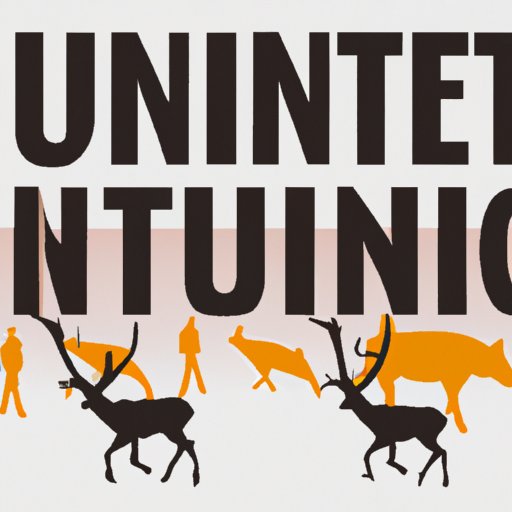Introduction
Hunting is defined as the pursuit, capture, and killing of animals for food or sport. It is an activity that has been practiced by humans since pre-historic times, and continues to be a popular recreational activity today. While there are some who view hunting as cruel and unnecessary, the reality is that hunting can have a positive impact on the environment, if done responsibly.
How Hunting Helps Reduce Overpopulation of Certain Species
One of the ways that hunting can help the environment is by reducing overpopulation of certain species. When a population of animals becomes too large, it can lead to problems such as competition for resources, habitat destruction, and disease outbreaks. By controlling the population size, hunting can help prevent these issues from occurring.
Benefits of reducing overpopulation include increased biodiversity and improved habitat quality. Examples of overpopulated species that can benefit from hunting include deer, elk, antelope, and moose.
Promoting Biodiversity
Hunting can also help promote biodiversity in an ecosystem. When certain species become too numerous, they can outcompete other species for resources, leading to a decrease in biodiversity. By controlling the population size of these species, hunting can help promote a healthier balance of species in an ecosystem.
Ways hunting can promote biodiversity include protecting habitats, restoring native species, and maintaining healthy populations of predators. These activities can all help ensure that an ecosystem remains healthy and diverse.
Positive Economic Impact
In addition to its environmental benefits, hunting can also have a positive economic impact. Hunting can bring money into local economies through taxes, fees, and permits. In addition, hunting can provide jobs for guides, outfitters, and other related businesses.
For example, hunting can generate revenue for states through the sale of licenses and tags. In the United States, this revenue is often used to fund conservation efforts, such as creating sanctuaries for endangered species, managing fish and wildlife populations, and providing educational opportunities.
Conservation Efforts
Hunting can also help promote conservation efforts to protect endangered species. By limiting the number of animals that can be taken, hunters can help ensure that endangered species do not become extinct. In addition, hunting can help create sanctuaries for endangered species, which can serve as safe havens for them to thrive.
Other conservation efforts that hunting can help support include habitat preservation, reintroduction of native species, and research into the effects of climate change on wildlife populations.
Controlling Invasive Species
Finally, hunting can help control invasive species, which can disrupt entire ecosystems. By targeting invasive species, hunters can help reduce their numbers and prevent them from spreading further. This can help protect native species and maintain a healthy balance of species in an ecosystem.
Invasive species can have a devastating effect on an ecosystem, so it is important to control their populations. Hunting can be an effective way to do this, as it can help prevent invasive species from taking over an area and displacing native species.
Conclusion
Hunting can have a positive impact on the environment, if done responsibly. It can help reduce overpopulation of certain species, promote biodiversity, have a positive economic impact, and encourage conservation efforts to protect endangered species. Hunting can also help control invasive species, which can have a devastating effect on an ecosystem. Overall, hunting can be a beneficial activity if done properly.
Therefore, it is important to recognize the environmental benefits of hunting, and to practice responsible hunting techniques to ensure that the environment is protected. With proper management, hunting can be an effective tool for preserving our natural resources.


